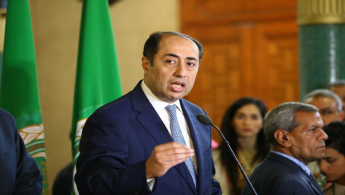Arab League delegation arrives in Beirut to discuss Lebanon-Gulf crisis
An Arab League delegation has arrived in Beirut on Monday to discuss the diplomatic row between Lebanon and Saudi Arabia and its Gulf allies, which erupted late last month with no signs of deescalation.
Led by Secretary-General Deputy Hossam Zaki, the delegation is expected to meet with high-ranking Lebanese officials to try and find a way to ease the unprecedented crisis between Lebanon and the Gulf states.
"Arab relations are important for Lebanon and the Gulf states and I believe that the efforts we are making could go in a positive direction, and we hope that this is the starting point to overcome this crisis," Zaki said after meeting with Lebanese Prime Minister Najib Mikati.
He added that the Arab League's initiative also aimed to understand where Lebanon stands in the crisis and what it plans on doing.
Saudi Arabia, the UAE, Kuwait and Bahrain pulled their ambassadors from Beirut and stopped Lebanese imports, following comments made by Lebanese Information Minister George Kordahi who criticised the Saudi-led military intervention in Yemen.
Al-Araby Al-Jadeed, The New Arab’s sister site, has learned that some Lebanese ministers have begun discussing ways to compensate for the economic losses faced by the import ban in closed door meetings.
Blocking Lebanese imports has dealt another economic blow to the country already its in worst ever crisis. The UAE and Saudi Arabia are Lebanon’s second and third largest export markets, respectively.
A source close to Mikati told Al-Araby Al-Jadeed that "the crisis is difficult and its solution will not be that easy, but every step or effort to address it we look at with hope, because there are parties that stand by Lebanon and continue to help it, whether American, French, European or Arab," adding that it was looking positively to Monday’s visit.
Qatar's foreign minister is also expected to visit Lebanon to help solve the crisis, but no date has yet been set. Unlike its Gulf neighbours, Doha did not recall its ambassador from Beirut.
Lebanon's relations with its once strong Gulf allies have taken a hit in recent years due to what Riyadh considers to be Hezbollah's growing influence in the country.
Hezbollah, the Shia paramilitary group backed by Iran, is designated a terrorist organisation by the Gulf Cooperation Council. The militant group is also supporting Houthi rebels in Yemen, which the Saudis have been battling since 2015.





 Follow the Middle East's top stories in English at The New Arab on Google News
Follow the Middle East's top stories in English at The New Arab on Google News


